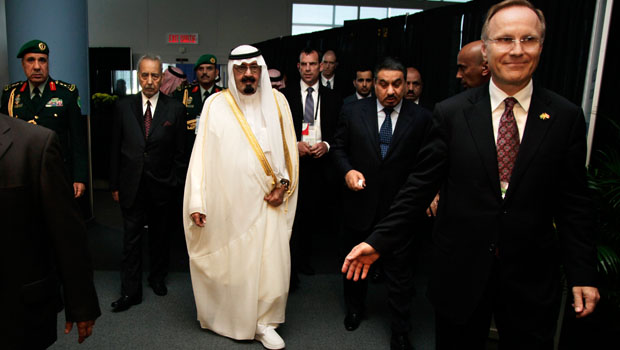TORONTO: The G20 Summit that gets under way here amid unprecedented security on Saturday at the Metro Toronto Convention Center is being tipped by many as an economic clash of civilizations. Signs of deep rifts over how to quickly cut national deficits instead of continuing to stimulate them were visible among the global economic leaders.
Prior to the G20 Summit, leaders of the Group of Eight (G8) major industrial nations — the United States, Japan, Germany, France, Britain, Italy, Canada and Russia — met at the picturesque Deerhurst Resort of Muskoka, some three hours drive from Toronto, on Friday, discussing ways to overcome their sharp differences on the issue.
Later over dinner on Friday, G20 leaders also discussed political issues confronting the world, including Iran's nuclear program and possible sanctions on North Korea following the sinking of a South Korean warship.
Custodian of the Two Holy Mosques King Abdullah is already in Toronto to represent Saudi Arabia at the summit. Saudi membership of the G20 is in direct recognition of its position as the single largest oil exporter in the world, in addition to being a country with the largest oil reserves.
King Abdullah is representing the Arab and Islamic world at the summit, seeking to hold discussions with leaders on Arab and Islamic issues, especially the Palestinian cause, the future of the Arab-Israel peace process and Iran's nuclear files, analysts here in Toronto underlined.
Before leaving Riyadh for the summit, King Abdullah also discussed the G20 agenda with Canadian Prime Minister Stephen Harper over the telephone.
With increasing fears of a double-dip recession, as house sales in the US recorded falls and employment picked up slowly, the US has been insisting on continuing stimulus measures on a global scale for the economy.
US President Barack Obama said he is concerned that severe austerity measures introduced in several European countries could hold back economic recovery.
He also warned that the US cannot be expected to pick up all the slack, and that "surplus countries" must find ways to stimulate growth and promote trade. Talking to the press in Toronto, the US Treasury Secretary Timothy Geithner insisted that growth had to be the priority.
However, Europe, which is reeling from the Greece bailout package and a growing deficit, wants to control the growing budgetary deficit. German Chancellor Angela Merkel and her European colleagues have been insisting that plans to cut the deficit would not stall growth and that they need to go for austerity to support their budgets.
On Thursday Merkel insisted Germany would continue with $100 billion in cuts, in line with similar plans outlined in the UK, Italy, France, Spain and Greece.
At a news conference in Toronto, European Commission President José Manuel Barroso said Europe could no longer afford to borrow and spend and must repair its budgets in order to rebuild confidence for growth.
The election of a British government supporting the new austerity mood inside the EU has decisively shifted the balance in the G20 toward greater action to cut deficits. Underscoring the cost-cutting climate, the Elysees Palace said Thursday it would not hold a traditional Bastille Day garden party — last year’s cost was about $900,000 — for the first time since the French Revolution.
Summit hosts Canada was, however, attempting to strike a balance between Europe and the US. Prior to the meeting, Canada called on the G20 to agree to halve their deficits by 2013 and bring their debt to GDP ratios down to more sustainable levels.
As world leaders assembled, Toronto's downtown core resembled a fortress with a big steel and concrete fence erected over several blocks to protect the summit site from possible protests.
Canadian police patrolled the Lake Ontario waterfront on boats and jet skis. The number of security forces protecting the summit meetings was estimated at 19,000, drawn from all over Canada.
A number of schools in the downtown Toronto area, including the prestigious University of Toronto’s downtown campus, were closed down and exams rescheduled, so as to avoid any major disturbance.
Even at the peaceful Deerhurst Resort, where the G8 leaders met on Saturday, small and peaceful protests were held on Thursday, despite the massive security presence.
After the protest Maude Barlow, national chairman of the Council of Canadians that organized the protests, said the G8 and G20 should be scrapped. “They should move to a G-192 at the United Nations which really represents the people of the world,” she said. “It’s more of the same bad medicine that got us here in the first place.”
Police forces in charge of security for the G20 in Toronto have also been granted special powers for the duration of the summit. Already three arrests were made by police under newly enacted laws on Friday morning. The new powers are in effect on the streets and sidewalks in and around the security fence.
Under the new regulations, police, at their discretion, can deny access to the area and "use whatever force is necessary" to keep people out.










